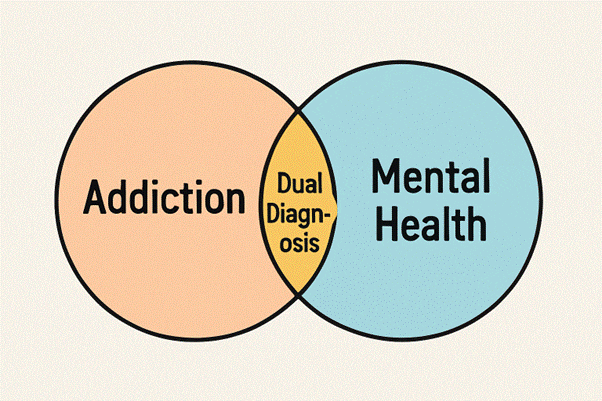Key Takeaways
- Rehabilitation programmes address both addiction and mental health disorders concurrently.
- Integrated treatment plans improve long-term recovery outcomes.
- Therapies like Cognitive Behavioural Therapy (CBT) are effective in treating co-occurring disorders.
- Support systems and lifestyle changes play a crucial role in sustained recovery.
Addressing both dependence and internal health struggles can feel inviting, especially when both are present and connected. For numerous people, recovery begins with technical programmes that highlight the significance of addressing these challenges contemporaneously. By exercising approaches that concentrate on both substance use and cerebral well-being, individuals have a lesser chance at long-term mending. For those seeking original coffers, Denver rehab In Colorado, it offers a range of integrated services for comprehensive support.
Effective recovery from co-occurring conditions involves understanding how internal health and dependence influence each other. Rehab programmes result in that address root causes and walls, fostering lasting change. Binary opinion requires comprehensive care to manage overlapping symptoms, triggers, and actions. An intertwined approach provides tools for enhancing adaptability and precluding relapse. Professional support, education, and coffers are also pivotal for recovery and the loved
of those affected.
Understanding Dual Diagnosis
A binary opinion occurs when an individual contends contemporaneously with a substance use complaint and an internal health complaint similar to depression, anxiety, or a bipolar complaint. According to the Substance Abuse and Mental Health Services Administration (SAMHSA), nearly half of those with a substance use complaint experience co-occurring internal health issues. Feting the intricate interplay between these conditions is an abecedarian step toward substantiated treatment.
Symptoms of one condition can frequently mask or consolidate those of the other, complicating opinion and treatment. Rather than treating each collectively, recovery programmes specialising in binary opinion work to untangle how mood diseases, trauma, or anxiety energy maladaptive managing mechanisms like substance use.
The Importance of Integrated Treatment
Historically, internal health diseases and dependence were frequently treated independently, leaving them vulnerable to relapse or deficient mending. Ultramodern integrated programmes design treatment plans that weave together interventions for both conditions, so neglecting one raises the threat of aggravating the other.
- Behavioural Therapies: styles like Cognitive Behavioural Therapy (CBT) and Contingency Management replace old managing habits with probative, positive actions and challenge patterns that lead to both substance use and internal health flare-ups.
- Medications might be specified to stabilise mood, reduce jones, and address underpinning symptoms of internal illness — always under careful supervision to avoid new avenues for abuse.
- Group Therapy and Peer Support: Connection with others on an analogous path provides a sense of belonging and responsibility and acts as a stopgap, expanding the tools for recovery beyond the remedy room.
Concurrent treatment models yield advanced rates of recovery, lower relapse threat, and enhanced day-to-day functioning, emphasising the critical significance of holistic care.
Therapeutic Approaches in Rehab
Treatment settings use a variety of substantiation-grounded curatives, acclimated to each existent’s requirements, life gestures, and underpinning conditions.
- Cognitive Behavioural Therapy (CBT): Empowers individuals to reframe negative thinking, challenge automatic reactions, and understand the connections between their thoughts, feelings, and actions.
- Dialectical Behaviour Therapy (DBT): Designed for individuals experiencing intense emotions, DBT equips clients with tools to regulate their mood, withstand distress, and enhance interpersonal effectiveness.
- Mindfulness-Based Interventions: By fostering a nonjudgmental awareness of the present moment, mindfulness can help manage cravings, reduce anxiety, and prevent habitual relapse.
These curatives, supported by ongoing assessment and inflexibility in programme design, give individuals the space to explore the roots of their challenges and chart a tailored path forward.
The Role of Support Systems
Recovery is infrequently achieved in insulation. Family members, close musketeers, and peer groups come as inestimable mates on the mending trip. Support can come from structured family remedies, informal networks, and peer support associations like Narcotics Anonymous or Rummies Anonymous. These communities encourage open sharing, reduce insulation, and support responsibility.
Effective recovery programs frequently integrate family education and support, strengthening connections and addressing the ripple effects of binary opinion on loved ones.
, which is crucial to sustainable success beyond discharge.
Incorporating Lifestyle Changes
Lasting recovery is supported by diurnal opinions and habits. Structure provides stability, so developing new routines, maintaining a balanced diet, and incorporating regular exercise are all emphasised in binary opinion treatment plans. These life variations promote neurobiological mending and help offset triggers and relapses.
- Morning and evening rituals establish a sense of pungency and purpose.
- Nutritive guidance helps restore emotional and physical equilibrium affected by dependence.
- Engaging in physical exertion, whether through walking, yoga, or sports, helps reduce stress hormones, boosts self-confidence, and supports overall brain health.
As individualities acclimatise to these new habits, they gain a sense of autonomy and accomplishment, pivotal rudiments in long-term recovery.
Conclusion
Recovery from substance use and co-occurring internal health diseases requires a comprehensive, intertwined approach — one that recognises the unique interplay between mind, body, and terrain. Through substantiation-grounded curatives, robust support systems, and purposeful life changes, individualities can find stability and renewed purpose. With the right coffers and a platoon that understands the complications of binary opinion, the trip to mending becomes not only possible but also sustainable.







